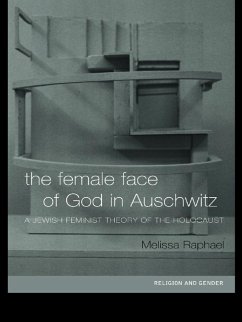The Female Face of God in Auschwitz, the first full-length feminist theology of the Holocaust, argues that the masculinist bias of post-Holocaust theology becomes fully apparent only when considered in the light of both women's perceptions of God and of their holocaustal experiencesand priorities. Building upon published testimonies of four women imprisoned at Auschwitz-Birkenau--Olga Lengyel, Lucie Adelsberger, Bertha Ferderber-Salz, and Sara Nomberg-Przytyk--it considers women's distinct experiences of the holy in relation to God's perceived presence and absence in the camps. Engaging with Berkovits, Fackenheim, Levinas and other post-Holocaust Jewish thinkers, The Female Face of God in Auschwitz is a radical and subtle meditation upon God's role and meaning. Questioning the true nature of the Jewish God present in Auschwitz, and arguing for God's participation in its extremities of suffering and grace, it powerfully resists defamatory interpretations of the Holocaust as evidence of divine vengeance, indifference or neglect.
Dieser Download kann aus rechtlichen Gründen nur mit Rechnungsadresse in A, B, BG, CY, CZ, D, DK, EW, E, FIN, F, GR, HR, H, IRL, I, LT, L, LR, M, NL, PL, P, R, S, SLO, SK ausgeliefert werden.
'Raphael has written a bold book that will become an instant classic among those interested in Holocaust studies, as well as feminist and contemporary theology. Her feminist critique of contemporary patriarchal Jewish Holocaust theology and philosophy, as well as her rejection of the 'discourse of ruin' guiding historical approaches to the Holocaust should be mandatory reading for all involved in Holocaust studies. She has written a persuasive defence of faith in the darkest of times and places.' -
'Raphael's vision is braev and daring. The female image of God does not remain a postulate, but is carefully described and convincingly argued ... The book is a great gain both for feminist post-holocaust theology and for reflection of an image of God that includes the experiences of women in situations of great suffering.' - Yearbook of the European Society of Women in Theological Research
'Raphael's vision is braev and daring. The female image of God does not remain a postulate, but is carefully described and convincingly argued ... The book is a great gain both for feminist post-holocaust theology and for reflection of an image of God that includes the experiences of women in situations of great suffering.' - Yearbook of the European Society of Women in Theological Research
'Raphael has written a bold book that will become an instant classic among those interested in Holocaust studies, as well as feminist and contemporary theology. Her feminist critique of contemporary patriarchal Jewish Holocaust theology and philosophy, as well as her rejection of the 'discourse of ruin' guiding historical approaches to the Holocaust should be mandatory reading for all involved in Holocaust studies. She has written a persuasive defence of faith in the darkest of times and places.' -
'Raphael's vision is braev and daring. The female image of God does not remain a postulate, but is carefully described and convincingly argued ... The book is a great gain both for feminist post-holocaust theology and for reflection of an image of God that includes the experiences of women in situations of great suffering.' - Yearbook of the European Society of Women in Theological Research
'Raphael's vision is braev and daring. The female image of God does not remain a postulate, but is carefully described and convincingly argued ... The book is a great gain both for feminist post-holocaust theology and for reflection of an image of God that includes the experiences of women in situations of great suffering.' - Yearbook of the European Society of Women in Theological Research

